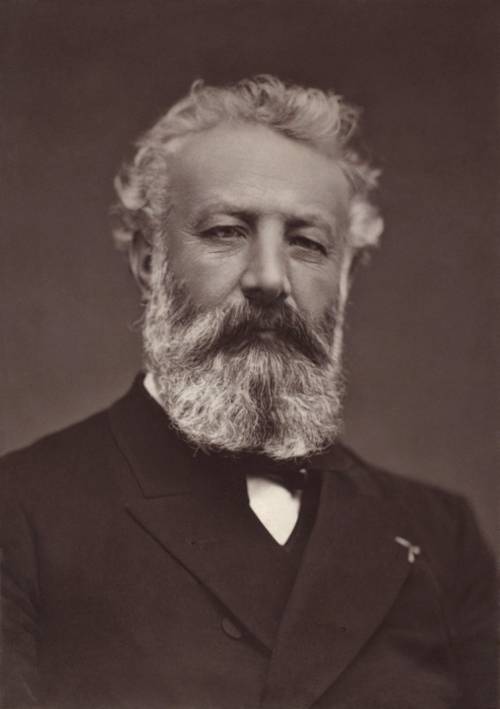
FAQ About Jules Verne

Who was Jules Verne?
Jules Verne was a French author born on February 8, 1828, in Nantes, France. He is best known for his adventure novels, which often incorporated elements of science fiction and imaginative explorations. Verne is considered one of the pioneers of the science fiction genre, and his works have had a lasting impact on literature and popular culture.

What are some of Jules Verne's most famous works?
Some of Jules Verne's most famous works include "Twenty Thousand Leagues Under the Sea," "Journey to the Center of the Earth," and "Around the World in Eighty Days." These novels are celebrated for their adventurous plots and innovative use of scientific concepts, which have captivated readers for generations.

Why is Jules Verne considered a father of science fiction?
Jules Verne is considered a father of science fiction because of his ability to blend accurate scientific knowledge with imaginative storytelling. His novels often explored futuristic inventions and adventures that pushed the boundaries of contemporary scientific understanding. Verne’s works have inspired countless authors and have become foundational to the science fiction genre.

What themes did Jules Verne explore in his novels?
Jules Verne's novels often explored themes of exploration, adventure, and the wonders of scientific discovery. His stories frequently featured protagonists embarking on daring expeditions, encountering unknown terrains, and utilizing cutting-edge technology. Verne was also interested in the human spirit of curiosity and the relentless pursuit of knowledge.

How did Jules Verne influence modern science fiction?
Jules Verne influenced modern science fiction by laying the groundwork for the genre through his imaginative and scientifically-informed narratives. He introduced concepts such as submarine travel, space exploration, and air travel in a time when such ideas were still speculative. Many modern science fiction writers cite Verne as an inspiration for his ability to envision the future.

What inspired Jules Verne's writing?
Jules Verne's writing was inspired by his fascination with travel and exploration, scientific advances of the time, and his vivid imagination. As a child, he was intrigued by adventure stories, and as he grew older, he closely followed new scientific developments, incorporating them into his stories to create fantastical yet plausible adventures.

Was Jules Verne's work popular during his lifetime?
Yes, Jules Verne's work was quite popular during his lifetime. His novels were published in multiple languages and enjoyed widespread popularity, making Verne a well-known figure globally. His engaging storytelling and innovative ideas captured the imagination of readers, contributing significantly to his popularity.

Did Jules Verne accurately predict future technologies?
Jules Verne did make several predictions that closely aligned with future technological developments. For instance, he imagined submarines in "Twenty Thousand Leagues Under the Sea" and space travel in "From the Earth to the Moon." While not all his predictions came true, his work showcased an impressive foresight into the possibilities of science and technology.

What was the impact of Jules Verne's work on popular culture?
Jules Verne's work has had a profound impact on popular culture, inspiring countless adaptations across film, television, and theater. His novels have become classics, and their themes of adventure and discovery continue to resonate with audiences. Verne’s ability to capture the imagination has kept his stories alive in various cultural forms worldwide.

How did Jules Verne's early life influence his writing?
Jules Verne's early life, marked by a profound love for adventure and reading, greatly influenced his writing. Growing up in the port city of Nantes exposed him to stories of sea voyages, and his family's support for his education fueled his intellectual curiosity. These experiences shaped his imaginative storytelling and inspired his adventurous themes.

Where can I find translations of Jules Verne's works?
Translations of Jules Verne's works are widely available in bookstores, libraries, and online platforms. Several translations exist, providing access to his novels in numerous languages. Online platforms like Project Gutenberg also offer free access to many of his works, making them easily accessible to readers worldwide.

What challenges did Jules Verne face in his writing career?
Jules Verne faced several challenges in his writing career, such as initial rejections from publishers and disagreements over the content of his works. Despite these obstacles, his persistence in balancing creativity with scientific accuracy allowed him to overcome these challenges, eventually achieving significant success.

How has Jules Verne been commemorated posthumously?
Jules Verne has been commemorated in many ways, including numerous adaptations of his novels and the naming of geographical and astronomical features in his honor. Additionally, several literary awards and conventions celebrate his contribution to literature and science fiction, reflecting his lasting legacy.

What was unique about Jules Verne's writing style?
Jules Verne's writing style was unique due to its integration of detailed scientific and technological descriptions within the narrative. He meticulously researched contemporary scientific knowledge to add realism to his imaginative stories. This balance of factual and fantastical elements distinguished his works and appealed to both science enthusiasts and adventure readers.

What is the legacy of Jules Verne in literature?
Jules Verne's legacy in literature is characterized by his pioneering contributions to the science fiction genre. His imaginative yet scientifically-grounded narratives set a foundation for future writers, influencing countless genre developments. His works remain classics, continuously inspiring new generations of readers and writers alike.

Did Jules Verne collaborate with other writers or artists?
Jules Verne often worked with illustrator Édouard Riou, whose illustrations accompanied Verne's imaginative narratives, bringing his stories to life visually. While he primarily wrote independently, these collaborations helped enhance the appeal of his works, attracting a broader audience.

What was the impact of the Industrial Revolution on Jules Verne's writing?
The Industrial Revolution had a significant impact on Jules Verne's writing, as it was a period of rapid scientific advancement and technological change. Verne was inspired by these developments, incorporating the transformative potential of technology into his stories. His novels often reflect the spirit of innovation and discovery that characterized the era.

How is Jules Verne's work relevant today?
Jules Verne's work remains relevant today as it explores timeless themes of exploration, scientific curiosity, and human ingenuity. His imaginative foresight into technological possibilities continues to inspire innovators and scientists, making his novels enduring sources of inspiration for both literature enthusiasts and those interested in science and technology.

What was the socio-political context in which Jules Verne wrote his novels?
Jules Verne wrote his novels during a time of significant socio-political change, including the Industrial Revolution and various geopolitical shifts in Europe. These factors influenced his perspective on technology and exploration, allowing him to engage with contemporary issues such as colonialism, progress, and scientific ethics within his narratives.

What languages did Jules Verne's novels get translated into?
Jules Verne's novels have been translated into numerous languages worldwide, including English, Spanish, German, Chinese, and Russian, among others. His universal themes and engaging storytelling have allowed his works to resonate with a global audience, making them accessible to readers of diverse linguistic backgrounds.
